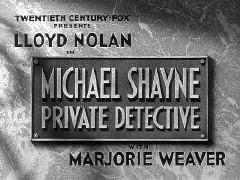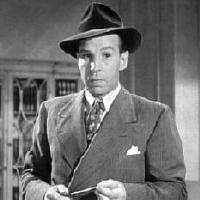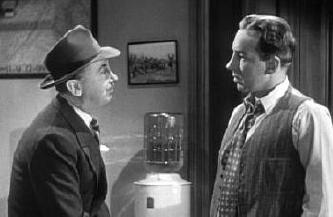Fri 22 Jun 2007
Movie Review – MICHAEL SHAYNE: PRIVATE DETECTIVE.
Posted by Steve under Characters , Mystery movies , Reviews[2] Comments

MICHAEL SHAYNE: PRIVATE DETECTIVE. 20th Century Fox, 1940. Lloyd Nolan, Marjorie Weaver, Walter Abel, Elizabeth Patterson, Donald MacBride, Douglas Dumbrille. Based on the novel Dividend on Death, by Brett Halliday. Director: Eugene Ford.
Some random thoughts that may shape themselves into a review, and maybe not. What you see is what you get. The recently released DVD set of the first few Shayne movies calls them noir. Not so. It’s a good selling point, but when it gets to the point that every black and white movie made in the 1940s with a crime or mystery in it is called noir, the word simply no longer has any meaning.
The first true noir film may have been The Maltese Falcon; I really haven’t thought about it too much, but it certainly could have been one of the first. I suppose it all depends on your own personal definition of noir.
MSPD came out a few months before TMF, and it may have been a step in the right direction, but it’s way too light-hearted, and Lloyd Nolan is a little too goofy in the leading role, for the film, based on author Brett Halliday’s Dividend on Death, to be anything close to noir, using anyone’s definition. TMF is played straight, giving audiences the feeling for what a tough mystery film (as opposed to gangster movie) could really be like.
At least, as I thought for a while, Michael Shayne doesn’t have a stooge for a sidekick in this movie — another step in the right direction — but on the other hand, Chief Painter (Donald MacBride) has a cop as his right hand man who is as dumb as they come, and Shayne does have Aunt Olivia (Elizabeth Patterson), who’s a dedicated fan of Ellery Queen, murder mysteries and The Baffle Book, to give him strong support when it counts.

Nolan I called goofy, but he’s still immensely enjoyable in the role, as long as you don’t think of him as Brett Halliday’s Michael Shayne. Seeing the repo men moving the furniture out of his office at the beginning of the film, when cases have apparently been tough to come by for him, certainly sets a certain tone. And watching him cover himself with a blanket when Phyllis Brighton (Marjorie Weaver), whom he’s been hired to bodyguard by her rich father, catches him with his pants down, is mildly funny but hardly, I suspect, how the real Michael Shayne might have reacted in the same situation.
Not that the real Michael Shayne was really truly tough-as-nails hardboiled or one of theose super-sexed PI’s who came along later, but Lloyd Nolan, he wasn’t either.
Perhaps as the series goes along, given the TMF influence, the humor lessens and the mystery is played straight, but even if it doesn’t, I’m not going to be concerned about it.
The story has to do with a gambling casino, horse-racing, a murder, a ditched dame, a possible suicide note, the switching of the barrels of two guns, a bottle of ketchup and a piece of jewelry that comes unpinned at the wrong time, perhaps even a couple of times. It really is a complicated case, I grant you that, which is one of the things I had in mind when I called this a possible transition into true noir from detective films that felt they also had to make the audience laugh.
It’s remarkable, looking back now, how all of the plot is made to fit into a tight 77 minutes, which I have a hunch is a little longer than the average murder mystery movie at the time. I’ve watched it twice now, and there’s not a minute that’s really wasted. It was well worth the time, and if I may say so, probably yours as well.

January 13th, 2011 at 9:15 pm
This is an old post, but i only just saw the movie.
This is not suppossed to be a Noir, it is a detective story. It does not have almost any other Noir element than a crime to solve. Does it?
Bogart can be very funny, but it is not in a jokey way, as Sam Spade, so compared to that, Nolan’s Det. is a little goofy, but
Nolan maintains his dignity even with his pants down, while “goofy,” makes me think of someone stupid like, Jerry Lewis. lol—–I just luuuv, little Rickie’s baby sitter as the side kick!
And it is charming the way lloyd Nolan respects her help and cuts her in at the end.————————–Trusting you, I wont think of Lloyd Nolan as Halliday’s Detective.
He is always good though and marjorie Weaver is wonderful.
This was my first Det. Shayne movie, but i bought a set of all of them, so i will be busy with him for a while. B)
January 2nd, 2021 at 1:29 am
Re: the first few paragraphs above, glad to see someone else mindful of this trend besides myself.
I’m adamantly opposed to “lumping everything under “noir”. I’ve argued against it in the past, so often, my tongue has dragged on the floor. I privately feel it’s improper and unfair in at least three dozen distinct ways.
‘Maltese Falcon’ is a title which frequently pops up in such debates, and I try not to let fixate on it although it’s certainly tempting tp use as a “test-case”. I myself don’t rank it as ‘noir’ but I’ve found that whenever making this film an ideological battleground …the terrain turns into a swamp under one’s feet.
Reason: I’ve encountered film-buffs out there who are just as adamant for “noir-ification” as I am against it; and when you meet with them over ‘Maltese Falcon’ they fight back like hellcats. Discussion breaks all bounds; and you wind up dissecting French poetry of the late 1800s.
I’ve ceased permitting myself to get embroiled in such armchair contests anymore. But I’m glad to see someone else in the world is at least, aware of the divide.